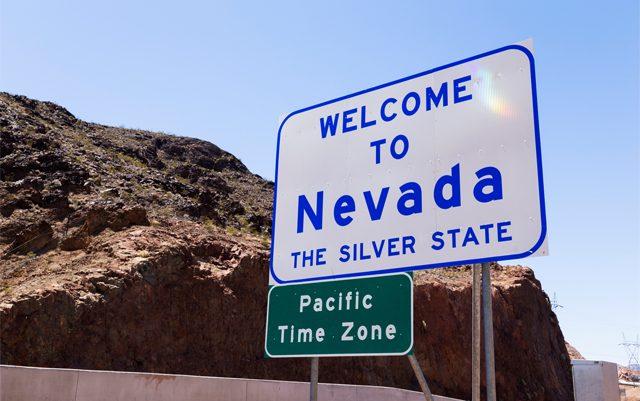Of the 5 states that will have recreational marijuana legalization on their ballot in November, perhaps none have more at stake in terms of economic activity than Nevada. Of course, California’s industry will generate more in terms of sheer numbers, but Nevada is a state of less than 3 million residents that sees an influx of 42 million tourists a year into Las Vegas alone. Marijuana legalization is likely to have more of an impact in terms of legal marijuana’s share of the economy in Nevada as compared to California, a state that generates economic activity in many more and varied ways.
Nevada relies on tourism; in fact, some 41% of all jobs in southern Nevada are supported by the tourism industry. Not only will legalization bring in more tourists, it will also draw customers from all the people that come for the gambling or sporting events or shows. And most of the people who travel to Nevada because of legal cannabis will likely spend money in other areas as well, including the hotel and casino industry.
With so much at stake, it’s important to look at exactly what the passage of Question 2 in Nevada would mean for the state. From Ballotpedia:
Question 2 would allow adults aged 21 or older to possess, consume, and cultivate some marijuana for recreational purposes. The initiative would create a new 15 percent excise tax, with revenue from the tax being spent on enforcing the measure and schools. It would also authorize and regulate marijuana retail stores, cultivation facilities, manufacturing facilities, testing facilities, and distributors.
To be more specific, Question 2 would allow for the personal use and possession of up to an ounce of dried cannabis in private or 1/8th of an ounce of concentrate. Adults aged 21 and older will be able to buy marijuana at a retail store, but only those outside the 25-mile radius of a store will be able to grow up to 6 plants in an enclosed, locked area at home.
“The most important aspect of Question 2 is that it will end the policy of punishing adults who choose to use marijuana,” Reggie Burton, a spokesman for the “Yes on 2” campaign, told The Marijuana Times. “Given that marijuana is less harmful than alcohol, the fact that any adult has ever been punished for using marijuana is absurd in the first place. Question 2 will also eliminate the criminal market for marijuana, which has grown under marijuana prohibition. Instead, marijuana will be sold by regulated businesses that will test products, package them properly, and check IDs so that marijuana is not sold to minors. Regulated sales will also generate tax revenue that will support K-12 education in Nevada.”
As in other states, Question 2 looks like it will be a close vote, but supporters recently got a huge boost when the largest union in Nevada endorsed it. Recent polls show a tight race, with one poll showing 47% support while another shows support at 53% while still another shows support at 57%. So there is really little way to tell what is going to happen on Election Day.
“We expect a tight race and will be gearing our efforts toward educating voters through grassroots campaigning, along with a robust online digital media and television advertising campaign,” Reggie Burton told us.
Taxes and Education
When seeking to legalize marijuana in a state, certain truths have to be taken into account. One of those truths is that without people who don’t regularly use marijuana voting in favor, no measure has a chance to pass. With roughly 10-13% of adults using marijuana in the last year, that leaves a lot of ground to make up when it comes to winning at the ballot box.
This also means that most voters just don’t care all that much whether marijuana is legal or not. So you have to make them care, which entails highlighting job creation, tax revenue and most importantly, tax revenue for education.
“The initiative establishes a 15% excise tax on wholesale marijuana sales, to be paid by licensed cultivators,” it says on the “Yes on 2” website. “Retail marijuana sales will be subject to standard state and local sales taxes, just like sales of any other tangible product. The taxes and fees paid by licensed marijuana businesses will first be used to fund state and local implementation and enforcement of regulations. All remaining revenue will be deposited in the State Distributive School Account and used to support public K-12 education.”
And from the point of view of “Yes on 2”, their message seems to be resonating with voters. “From elected officials to labor unions to the general public, there is growing support for regulating marijuana like alcohol,” said Reggie Burton. “We hear from people all the time who are sick and tired of outdated marijuana laws that punish adults for using a substance less harmful than alcohol. They are tired of law enforcement resources being spent on marijuana-related offenses. And they are tired of having marijuana sold on the streets in their communities. They are excited to vote for Question 2.”
The Opposition
As supporters of Question 2 focus on children, so do opponents. A trip to the “No on 2” campaign website shows you their focus: kids can’t tell marijuana gummies from regular gummies so your kids are in danger.
Of course, studies have shown how much less dangerous cannabis is than many common household products, but there is also the issue of parental responsibility. Add to that the fact that strict packaging and labeling guidelines will be enacted when it comes to retail sales and you have to wonder why the “No on 2” campaign would want to leave all of that in the hands of black market drug dealers who don’t check ID’s instead of parents and regulators.
I asked the “Yes on 2” campaign about their opposition and the possibility of a last minute major donation from someone looking to block the measure from passing. “Sure, a major donation to the opposition campaign is a concern,” Reggie Burton said. “And it will be unfortunate if one individual funds a collection of lies and distortions that have a significant impact on the election. But we do not spend too much time concerning ourselves with who is opposing us. Instead, we are simply focused on educating Nevada voters about the benefits of ending marijuana prohibition. In the end, we believe that will be sufficient to win, regardless of the opposition.”
The 25-Mile Home Grow Halo
As mentioned above, there is a detail of Question 2 in Nevada that sets it apart from similar legalization measures around the country: anyone within 25 miles of a marijuana retail shop will not be allowed to grow the up to 6 plants allowed to those not in that radius. This is similar to a rule in Arizona that keeps patients who live within 25 miles of a dispensary from legally home-growing, a rule that will seemingly be overridden if Prop 205 passes in AZ.
This rule will certainly be good for marijuana retailers as it will cut down on their competition, but a critical part of any real marijuana legalization has to be allowance for home growing for all adults. Hopefully this is something that will be amended down the line if Question 2 does pass in November.
Down to the Wire
On November 8th Nevada voters will go to the polls to decide on many things, including Question 2. It will be the end of a battle that was a long time in the making for the “Yes on 2” campaign.
“Signature drives are never easy,” Reggie Burton told us. “But the Coalition to Regulate Marijuana Like Alcohol (CRMLA) submitted almost 200,000 signatures from throughout the state in 2014, far exceeding the 101,667 signatures required to qualify the measure for the 2016 November ballot. After being certified, the petition was transmitted to the state legislature, which could have passed the measure in 2015. The legislature did not act, so the initiative was placed on the November 2016 general election ballot. Voters now have the opportunity, by voting YES, to end the failed policy of marijuana prohibition and replace it with a system of regulation.”
In just a few weeks we’ll know what the voters of Nevada have decided.






